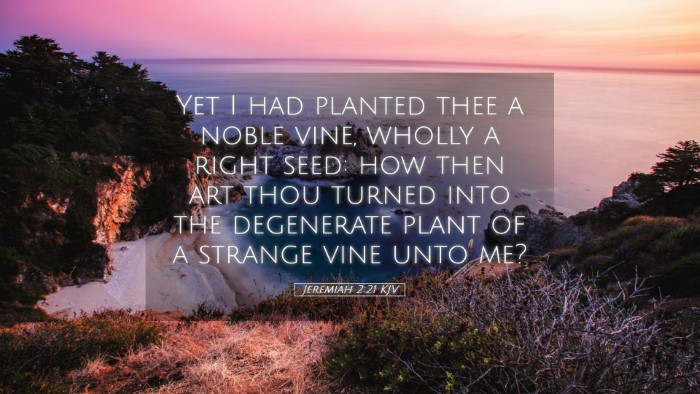Commentary on Jeremiah 2:21
Jeremiah 2:21 states: "Yet I had planted thee a noble vine, wholly a right seed: how then art thou turned into the degenerate plant of a strange vine unto me?" This verse serves as a poignant reflection of Israel's spiritual decline and the profound disappointment of God toward His chosen people.
Jeremiah's Prophetic Context
Historical Background: Jeremiah, often called the "weeping prophet," ministered during a time of great moral and spiritual decay in Israel. His lamentations over the Israelite’s infidelity provide a backdrop for understanding the significance of this verse. God had set Israel apart, cultivating them like a noble vine, but they had deviated from the righteousness expected of them.
The Metaphor of the Vine
Spiritual Significance: The imagery of the vine has deep roots in biblical tradition, used frequently to represent Israel’s relationship with God. As noted by Matthew Henry, the metaphor highlights both God's careful cultivation and Israel's failure to fulfill its intended purpose. The notion of a "noble vine" indicates not only their potential but also the divine intention behind their creation as a people set apart for holiness.
Degeneration: The phrase "degenerate plant" signifies a sharp decline from their intended glory. Albert Barnes emphasizes that the transformation into a "strange vine" reflects how Israel had adopted foreign practices and idolatry, leading to spiritual ruin. This deviation serves as a warning that the closer one moves toward secular influences, the further one distances oneself from God’s original purpose.
The Nature of Divine Disappointment
The Heart of God: The verse captures divine disappointment. Adam Clarke highlights that God’s love and investment in Israel had been substantial, making their turn from Him even more tragic. God’s question signifies an invitation for reflection; it is a call for Israel to reconsider their current state in light of the blessings they have forfeited.
Contrast with Original Intent: The juxtaposition of the noble vine with the strange vine poses significant theological reflections. It suggests that decline is often gradual and can lead one away from the original calling and purpose. The transformation reflects a heart that has strayed from its first love and a people who have forgotten their covenant with God.
Practical Applications for Today
For contemporary believers and leaders, Jeremiah 2:21 serves as a sobering reminder of the importance of remaining steadfast in one’s faith and commitment to God.
-
Self-Examination: Like Israel, individuals and communities must regularly assess their spiritual health. Are they nurturing their relationship with God or allowing foreign ideologies to influence their beliefs?
-
Emphasis on Discipleship: Investing in spiritual growth can help counteract tendencies to stray. The Church is called to cultivate discipleship that promotes a closer walk with God.
-
Cultural Engagement: As leaders and scholars engage with culture, they must remain vigilant against the potential pitfalls of conforming to secular standards that can corrupt foundational beliefs.
Conclusion
Jeremiah 2:21 encapsulates profound truths about God’s expectations and the tragic consequences of deviation from divine purpose. Through historical lenses and spiritual introspection, modern readers can glean vital lessons that resonate deeply within the context of their spiritual journey, ensuring that they remain aligned with God's intentions. As they meditate on this verse, may they be encouraged to cultivate their lives as "noble vines," fully committed to bearing fruit for the kingdom of God.


